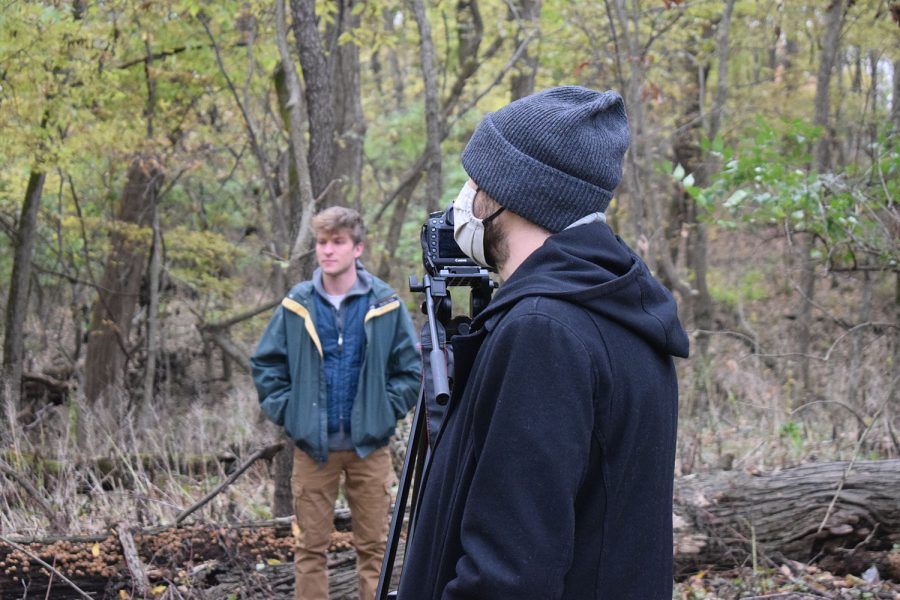Essential Workers: A Portrait honors those who are needed now most by combining theater and art
In a two-part production, the final UI Theatre Department Mainstage of the fall season showcases the stories of real essential workers in plays written and performed by students.
Associate director and media engineer Nick Coso and actor Derek Donnellan record Episode 4 of “Essential Workers: A Portrait.” Photo by Mady Davis
November 17, 2020
The University of Iowa Theatre Department’s final mainstage of the fall season paints a picture of what it’s like to be an essential worker in 2020 — and that’s not a figure of speech.
Essential Workers: A Portrait is a series of seven performances that highlight the real lives of local and global essential workers. While their stories are shared, a time-lapse video of their portraits being created by an artist will be shown in the corner of the screen.
The production is split into two parts, with the first including four workers and the second including three. Part one premiered Nov. 14 and is currently available to stream on the Theatre Arts YouTube channel.
Featured essential employees include a teacher, a firefighter, a grocery store worker, and a CDC doctor and three more. Director Alan MacVey said although only seven people are having their stories and faces in the spotlight, he hopes that the show functions as an expression of gratitude for all essential workers.
MacVey was inspired to honor essential workers — those who’ve continued to work in-person during the pandemic — with portraits of themselves by a television program called Portrait Artist of the Year. The program shows the process of creating portraits that are meant to capture the essence of their subject.
“I looked at that and I thought ‘That’s kind of interesting, they’re painting a portrait of somebody and you watch it happen,” MacVey said. “Maybe we could do that for essential workers as a way of honoring them and showing respect.’”
To bring MacVey’s vision to life, five artists from the School of Art and Art History joined teams consisting of an actor and a playwright. While the theatrical side of the team interviewed the essential worker, the artist sketched or painted them.
MacVey said the Theatre Department provided filming equipment to each artist so a time-lapse of their progress could be displayed.
Brooke LeWarne, one of the essential workers featured, is a Northwest Junior High drama and literacy teacher. She said working with the team was a touching experience.
“I think most people right now during COVID aren’t used to people being interested in your life. You just kind of do your own thing,” LeWarne said. “It was such a lovely experience for me to feel like these people thought my life was worth talking about. And obviously I speak on behalf of a lot of teachers right now, not just me.”
In addition to working throughout the pandemic, LeWarne also became a new parent during it. She said leaving her child to teach in an environment that’s never truly socially distanced — despite safety measures — is a constant source of anxiety.
“I think the thing that people don’t get is that the fear doesn’t go away, you just get used to feeling that way,” LeWarne said.
Her struggles are showcased in a song written by playwright and graduate student Charlie O’Leary, who decided to create a musical number because of LeWarne’s background as a theatrical singer.
RELATED: UI Theatre Arts Department first mainstage production provides perspectives on social justice
Standing in front of a red background accompanied by a pianist, actress Sasha Tyler portrays LeWarne in a humorous light, contrasting against the performance’s heavier subject matter.
The performance keeps it simple, utilizing a few different camera angles to zoom in and out on Tyler, who remains stationary, dressed as a teacher.
While the song is full of moments that will make the audience chuckle, it becomes heartfelt by the end, showing LeWarne’s determination and heart.
After seeing the performance, LeWarne said she felt it captured her attitude toward the situation, since she tries to remain positive despite the challenges she faces.
LeWarne also felt that her portrait, painted with acrylics by UI graduate student Jarod Concha, captured her well. After going through bodily changes during her pregnancy, LeWarne said she liked seeing herself through someone else’s eyes.
Most importantly, she said she loves being a teacher, and her episode makes that clear.
Stage manager and second-year MFA student Mady Davis can relate to taking on a demanding and important job. She said putting on a show with so many elements was challenging, but the team behind the show was dedicated to showing their appreciation for essential workers.
“We wanted a way to celebrate and honor all essential workers, and to do that during a pandemic is challenging on its own,” she said. “We wanted each guest to have an episode dedicated just to them and a portrait of them to honor them. As theater people, this is the best way we can show our appreciation for them.”
Nick Coso, associate director, scenic designer and media engineer, said Davis’ work played a large part in making the show possible.
“I always say during theater that your stage manager is your No. 1 tool, and during this show in particular I can’t stress that enough,” Coso said. “If we didn’t have her as a liaison between the tech side and the content side, we would’ve been underwater.”
Coso said coordination, collaboration and communication were vital. This is in part due to some of the essential workers being located around the world, such as a firefighter in California or the police officer in Trinidad and Tobago.
“I think that’s one of the things that’s really special about this program,” Coso said. “We not only have people who do seven occupations that are critical during this time, but also we’re able to leave our little pocket of the world.”




